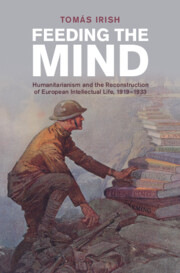Book contents
- Feeding the Mind
- Studies in the Social and Cultural History of Modern Warfare
- Feeding the Mind
- Copyright page
- Contents
- Figures
- Acknowledgements
- Abbreviations
- Note on the Text
- Introduction
- 1 1919
- 2 Feeding Bodies
- 3 Feeding the Mind
- 4 Knowledge Displaced
- 5 Books and Buildings
- 6 Who Were the Intellectuals?
- Epilogue: Beyond 1933
- Bibliography
- Index
6 - Who Were the Intellectuals?
Published online by Cambridge University Press: 07 October 2023
- Feeding the Mind
- Studies in the Social and Cultural History of Modern Warfare
- Feeding the Mind
- Copyright page
- Contents
- Figures
- Acknowledgements
- Abbreviations
- Note on the Text
- Introduction
- 1 1919
- 2 Feeding Bodies
- 3 Feeding the Mind
- 4 Knowledge Displaced
- 5 Books and Buildings
- 6 Who Were the Intellectuals?
- Epilogue: Beyond 1933
- Bibliography
- Index
Summary
This chapter shows how the crisis of the early 1920s and the intellectual relief that followed were essential to shaping European discourses about intellectuals and their roles in democratic societies. It begins by exploring well-known inter-war polemics by Julien Benda, Karl Mannheim, and Antonio Gramsci against the social backdrop of intellectual crisis and reconstruction. The chapter centres on Geneva as a crucible for bureaucracy and home to bodies that sought to categorize and organize international intellectual life. The chapter shows how a wide range of national and international organizations emerged in the 1920s to codify and protect the status of intellectuals and intellectual workers, and argues that all of this activity was motivated and conditioned by the post-war humanitarian crisis. While, by the late 1920s, the rights of intellectuals were increasingly – but unevenly – protected by international legislation, the rise of totalitarianism showed the vulnerability of intellectuals.
- Type
- Chapter
- Information
- Feeding the MindHumanitarianism and the Reconstruction of European Intellectual Life, 1919–1933, pp. 191 - 226Publisher: Cambridge University PressPrint publication year: 2023



